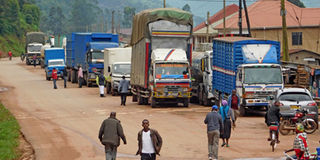Investors lose Shs180b in Rwanda border closure

Business halted. Cargo trucks that were blocked from proceeding to Rwanda queue up at Katuna border post on February 28. Rwanda has temporarily reopened its border for two weeks. PHOTO BY ROBERT MUHEREZA
Ugandan investors have lost about Shs180b since Rwanda closed its border with Uganda at Gatuna, the Private Sector Foundation-Uganda (PSF-U) has said. They also intend to petition President Museveni for intervention.
Mr Gideon Badagawa, the executive director of PSF-U, an umbrella body that brings together players in the private sector, said on average, Uganda would earn more than $200m (about Shs744b) annually from trade inflows with Rwanda through the Katuna border point and an average of $16m (about Shs60b) monthly.
But after the border closure, he said these earnings reduced from about Shs60b to an average of $2m (about Shs7.4b) monthly.
“We are losing business. Although politics is not losing, people are losing their jobs and this is going to be worse if this issue is not addressed,” Mr Badagawa said while addressing private investors in Kampala on Wednesday.
He said he would call all the players to compile all the losses and make a collective memorandum which he will present to President Museveni to show the extent the border closure has hurt Ugandan businesses.
Mr Badagawa said PSF-U will also contact their counterparts in Rwanda to make a similar memorandum and approach President Paul Kagame for intervention.
He urged presidents of both countries to resolve the outstanding issues and allow resumption of normal bilateral business transactions.
Background
On February 28, Rwanda closed its borders with Uganda at Gatuna and Cyanika in Kabale and Kisoro districts, respectively.
Hundreds of cargo trucks destined for Rwanda got stranded at the border points.
Rwandan authorities advised the truck drivers to turn back and use the Mirama Hill border in Ntungamo District, about 100km away.
The Rwandan government claimed the closure was prompted by the ongoing construction works to upgrade the customs post.
At the time of the border closure, Rwanda accused its neighbour of giving sanctuary or support to dissidents aimed at destabilising the Kigali administration and arresting her citizens in Uganda and detaining them in unknown places. Uganda has since denied the claims.
Rwanda reopened its border at Gatuna on Monday temporarily.
Rwanda Revenue Authority announced that the border would be reopened for only two weeks to allow extended testing of the construction works of the customs point on its side.
Mr Stuart Mwesigwa, the director of the East African Business Council, described the border closure as a “big loss to Uganda” because Rwanda is an already established market for Ugandan goods.
“Opening new markets is costly. It is a whole new process which cannot just be done now. We already spent a lot on creating new market with Rwanda. Starting afresh with other markets is not the best solution as of now,” Mr Mwesigwa said.
Several Ugandan companies present at the meeting said they had registered huge losses due to the border standoff.
Roofing said they have lost about $4m (Shs15b) monthly, Hima Cement $3.5m (about Shs13b) and Uganda Breweries 1.5m Pounds (about Shs7b) since the border closure.
Mr Byron Kinene, the chairman of regional lorry drivers and transporters association, said the closure has rendered drivers and cargo trucks redundant, resulting in loss of jobs and income.
“Before the closure of the border, there were more than 100 trucks that would enter Rwanda on a daily basis. Now we are speaking of about 20 trucks that use the other entrances. This has led to no work and some of these trucks are [operating] on loans which is a big loss to us,” Mr Kinene said.
Uganda had in January and December, before the standoff, earned $16.96m (Shs63.9b) and $16.90m (Shs63.7b) respectively at the time tension between the two countries started building up.
Uganda has not only been trading with Rwanda but also uses the country as a gateway to eastern DR Congo, which means that traders have to find longer and expensive alternative routes to such markets.


